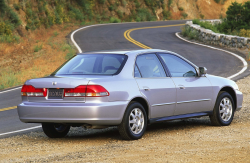
— Honda says it has confirmed a driver's side Takata airbag inflator exploded in a 2002 Honda Accord on March 3, 2017, sending shards of metal into the throat and vocal chords of the 18-year-old female driver.
While that news is scary enough, Honda says the airbag wasn't the airbag originally installed in the Accord, and the airbag inflator wasn't installed as part of the massive Takata recalls.
Honda believes the Takata airbag was likely removed from a wrecked car and then installed in the 2002 Accord without the owner knowing the dangerous inflator was in the car. No laws prevent those airbags from being pulled from a salvaged vehicle and reused in another vehicle.
Based on vehicle records, the 2002 Accord was involved in an April 2015 crash, causing the insurance company to declare the car a total loss. The Accord was then repaired and sold to the current owner in April 2016 with a salvaged title.
Honda knows the ruptured airbag inflator that injured the 2002 Accord driver came from a 2001 Accord, but the automaker doesn't know how the inflator ended up in the 2002 Accord.
Although the March 3 crash of the 2002 Honda Accord was considered minor, the injuries to the driver were anything but. Injured by the shrapnel was Karina Dorado, 18, who suffered severe wounds to her trachea and vocal chords, adding another victim to the nearly 200 people injured by exploding Takata airbags.
To date, at least 16 people have been killed by the metal airbag inflators that explode like a grenade, sending hot pieces of metal into vehicle cabins and occupants.
The problem is caused by a few factors, primarily the explosive chemical ammonium nitrate that is used to deploy the airbags in a crash. Scientists determined that over time, the metal inflators can allow moisture to invade the chemical, causing the ammonium nitrate to become unstable. What should be a small quick explosion becomes a deadly inferno of metal debris.
Honda says the 2002 Accord involved in the crash was included in airbag recalls in 2008 and 2014 to replace the driver's side Takata airbag inflators. Honda calls these inflators the "Alpha" inflators because they are the oldest Takata inflators at a 50 percent chance of exploding.
The original Alpha inflator was replaced under a recall in February 2012, then that inflator was replaced in January 2015. Both replacement repairs were performed by authorized Honda dealers, yet the inflator that exploded and nearly killed Karina Dorado wasn't one of those inflators.
Out of all the automakers involved in the recalls of tens of millions of vehicles to replace Takata airbag inflators, Honda more than any company has been hit the hardest with the consequences of Takata's failures.
The vast majority of fatalities have occurred in Honda vehicles and the automaker has literally went to extremes to convince owners to replace the older inflators.
Using mass advertising campaigns and even going to the homes of owners, Honda says it has plenty of safe replacement inflators made by a different airbag company.
The recalled vehicles with Alpha inflators include the following:
- 2001-2002 Honda Civic
- 2001-2002 Honda Accord
- 2002-2003 Acura TL
- 2002 Honda CR-V
- 2002 Honda Odyssey
- 2003 Acura CL
- 2003 Honda Pilot
If you own a Honda or Acura vehicle and have questions about the airbags, please call 888-234-2138.




